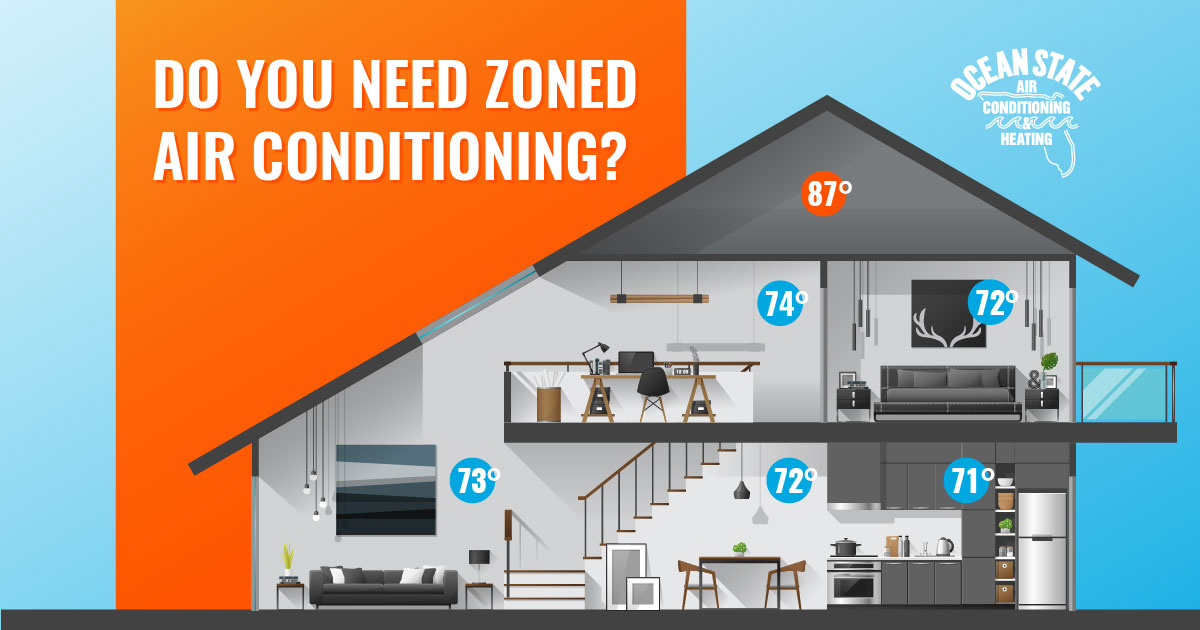Zoned air conditioning allows you to easily control the temperatures within individual rooms in your home. Most houses have one thermostat controlling a central air conditioning system that determines how cold or warm an entire home will be. But zoned air conditioning allows you to regulate different temperatures for different rooms. For example, if you have a room with a lot of direct sunlight, you may want to keep that room a little cooler than a room without windows or with indirect sunlight. Conversely, storage rooms may need to be kept at a slightly higher temperature than the rest of your house during colder months. In Florida, zoned air conditioning is especially beneficial as it can lead to energy cost savings, increased comfort throughout your home, and more.
How Does Zoned Air Conditioning Work?
Once you’ve separated your house into at least two different zones, a licensed HVAC professional will outfit each zone with its own programmable thermostat and install duct dampers to automatically vent and release hot or cold air into your home. Each individual thermostat is linked to a central control module that allows you to control each zone with just a few quick adjustments and settings.
In Florida, this can be especially helpful with the wide range of temperatures you might experience in a small amount of time. According to the Florida Climate Center of Florida State University, summer temperatures in Florida can range between 73° F and 95° F in a single day. That’s a 22-degree difference from just before sunrise to the hottest part of the afternoon. Different rooms will naturally be warmer or cooler based on several different factors. What are some best practices when it comes to splitting your home into individual zones and keeping everything at the temperature you decide?
How Should I Zone My Florida Home?
“The Sunshine State” isn’t just a nickname. Florida gets hot, especially in July and August. If you’re considering zoned air conditioning, the first thing you need to keep in mind is how the sun is currently interacting with your home. Are there rooms you frequent at certain parts of the day? Depending on your answers, you could group rooms together into a specific zone that either needs to be cooler because it gets a lot of direct sunlight, or warmer because it’s already shaded.
Most homes in Florida don’t have basements, but that doesn’t mean there aren’t multi-story homes. Many houses have a second (or even third) floor, and if you remember from science class—hot air always rises. Maybe your first floor is relatively cool, but when you go upstairs you feel the room start to get a little stuffy. That’s perfectly normal for a central air conditioning unit that’s treating all rooms the same. But if you had a zoned air conditioning system you could adjust each floor to be a little bit cooler than the one below it. That would offset the naturally hotter temperatures on your upper floors.
Can Zoned Air Conditioning Lower My Energy Bills?
With zoned air conditioning, you can easily set different temperatures for different rooms in your house. And with smart technology, you can even set heating and cooling to change automatically based on the indoor temperature, time of day, and more. That means the system is switching on and off less frequently, saving you money. In addition, zoned air conditioning reduces the workload on your system’s compressor and air handler, regulating the amount of energy each is doing throughout the day and reducing wear and tear. That means fewer repairs and a longer life for your heating and cooling system.
One easy way to keep thermostats running smoothly is to password protect them so that only select individuals in your home can change the settings. Want to install a smart thermostat in your Florida home? Click here to learn more about working with Ocean State Air Conditioning & Heating.

